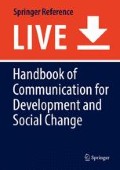Abstract
Following a political communications framework can provide useful critical understanding of the international philanthropic industries beyond the more traditional approaches of political economy, anthropology, and postcolonial studies. To this end, this chapter frames foreign aid and development assistance through theories of soft power, arguing that these activities are acts of public diplomacy and thereby conducive to the source government’s power accumulation motive. This is open to some contest across the literature as research framed under international political economy or social anthropology often assumes that international power redistribution is the primary motive. Analysis of these programs under the soft power framework allows for the discussion of the multitude of audiences that the activities engage with beyond the direct recipients of assistance as part of the power accumulation precedent. The chapter will hereby discuss the role of morality and compassion within the policy-making process, which leads to the question of whether we should really be considering whether most aid and development is in fact meant to work rather than the more popular query of why so much of it does not work.
References
Alexander C (2015) The communication of international development assistance: the case of the Taiwan international cooperation and development fund (ICDF). J Glob Gover 21(1)
Alexander C (2014a) China and Taiwan in Central America: engaging foreign publics in diplomacy. Palgrave Macmillan, New York
Alexander C (2014b) The public diplomacy of sub-state actors: the case of the Scottish government with Malawi. Palgrave J Public Dipl Place Brand 10(1)
BBC (2017) 2017 UK general election political leaders debate: 31 May 2017. Available from world wide web: [https://www.youtube.com/watch?v=xmopAnM_exA]. Accessed 18 July 2017
Escobar A (1995) Encountering development: the making and unmaking of the third world. Princeton University Press, Princeton
Forgacs D (ed) (1988) A Gramsci Reader. Lawrence and Wishart, London
Foucault M (1991) Discipline and punish: the birth of the prison. Penguin, London
ITV (2017) 2017 UK general election political leaders debate: 18 May 2017. Available from world wide web: [https://www.youtube.com/watch?v=wEgi50lP8co]. Accessed 18 July 2017
Lefebvre H (1991) The production of space. Blackwell, Oxford
Niebuhr R (1932) Moral man and immoral society: a study in ethics and politics. Charles Scriber’s Sons, New York
Nye J (2004) Soft power: the means to success in world politics. Public Affairs, New York
Orwell G (1949) 1984. London: Penguin
Robinson P (2002) The CNN effect: the myth of news, foreign policy and intervention. Routledge, London
Rousseau JJ (1993) The social contract and the discourses. David Campbell Publishers, London
Sassen S (2014) Expulsions: brutality and complexity in the global economy. Harvard University Press, Cambridge, MA
Schopenhauer A (1995) On the basis of morality. Hackett Publishing International, Indianapolis
Spykman N (1942) America’s strategy in world politics: the United States and the balance of power. Harcourt, Brace and Company, New York
Wilde O (1900) The soul of man under socialism. Free River Community, London
Yen M-H (2013) [Interview] Headquarters of the Taiwan ICDF, Taipei, Taiwan, with C. Alexander. 10th May 2013
Zizek S (2009) First as tragedy, then as farce. Verso, London
Author information
Authors and Affiliations
Corresponding author
Editor information
Editors and Affiliations
Rights and permissions
Copyright information
© 2018 Springer Nature Singapore Pte Ltd.
About this entry
Cite this entry
Alexander, C. (2018). The Soft Power of Development: Aid and Assistance as Public Diplomacy Activities. In: Servaes, J. (eds) Handbook of Communication for Development and Social Change. Springer, Singapore. https://doi.org/10.1007/978-981-10-7035-8_74-1
Download citation
DOI: https://doi.org/10.1007/978-981-10-7035-8_74-1
Received:
Accepted:
Published:
Publisher Name: Springer, Singapore
Print ISBN: 978-981-10-7035-8
Online ISBN: 978-981-10-7035-8
eBook Packages: Springer Reference Literature, Cultural and Media StudiesReference Module Humanities and Social SciencesReference Module Humanities

